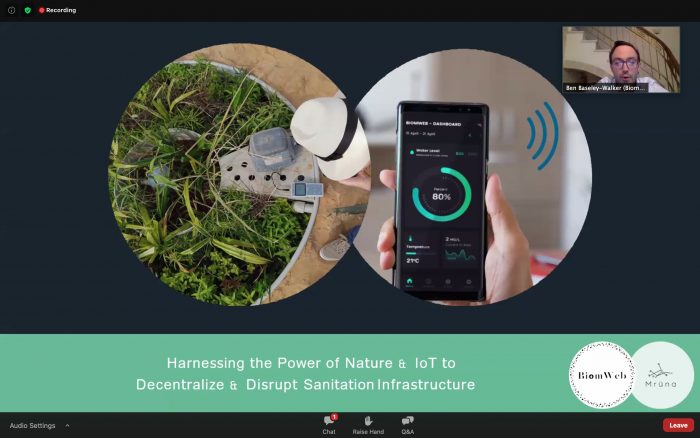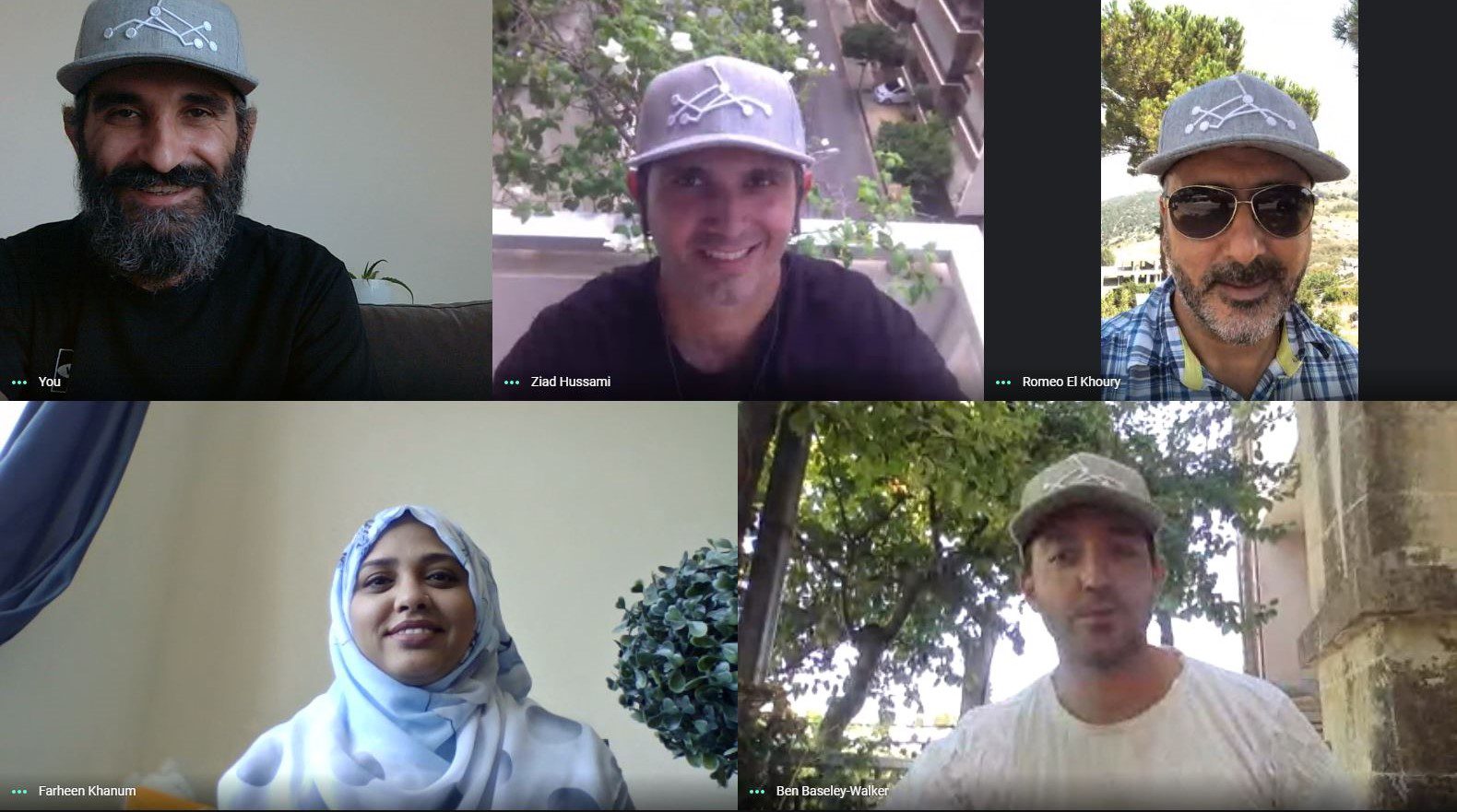Lebanese Wastewater Solution Wins Global Tech Innovation Competition

• Mrüna’s digital idea revolutionises access to sanitation and recycled water
• Low-cost, rapid tech solution for refugee camps and global urbanisation
• Winning InfraChallenge will help Mrüna transform urban infrastructure
The Global Infrastructure Hub (GI Hub) has crowned Lebanese tech start-up Mrüna the winner of its first global innovation competition, InfraChallenge, following a live pitch against nine other finalists from the UK, US, Sierra Leone, Australia, Mexico, Singapore and Spain.
Mrüna’s winning digital solution tackles the economic and social challenges of wastewater treatment with its decentralised nature-based system, BiomWeb. Using IoT, the solution treats wastewater onsite, negating the need to transport waste and recycled water, with a series of water tanks that mitate aquatic habitats found in nature, without the use of added chemicals, desludging, or vast infrastructure investment. Mrüna believes that BiomWeb will be adopted by refugee camps and informal settlements, as well as private and public sectors across the world.
We are so honoured to be the 2020 InfraChallenge winners and to be representing innovation from Lebanon. The start of Mrüna and BiomWeb was about us looking at the pollution in our rivers and the impact of sanitation on food chains and asking how we could start to do things differently. We’ve strived to have a nature-based system that is simple and accessible to all income brackets, and we are really excited to work with GI Hub and MIT Solve to push it out globally,” Co-Founder of BiomWeb, Ben Baseley-Walker said. Mrüna’s solution will help to accelerate the delivery of the United Nations Sustainable Development Goal 6 that pursues availability and sustainable management of water and sanitation for all.
The innovative and practical solutions submitted by our top 10 finalists were so impressive and I wish them all the best in progressing their ideas. We were looking for real ideas with real impact and we got them. I congratulate Mrüna on their wastewater solution and I’m so proud that InfraChallenge will help to make sanitation more accessible for all. Technology is the new frontier for infrastructure and its importance as a driver for real change and transformation has accelerated since COVID-19.
InfraTech has a profound purpose in ensuring the continued operations of critical infrastructure and it will play a key role in economic recovery around the globe,” the GI Hub’s CEO and InfraChallenge judge, Marie Lam-Frendo said.
The host country for InfraChallenge 2020 was Spain but the event was moved online due to the COVID-19 pandemic.
Based on the Spanish experience, and what has become evident with the pandemic, better monitoring of infrastructure through new technologies greatly improves logistics and control over the whole supply chain. This, in turn, enables better decision making in transport planning. In a nutshell, InfraTech is a lever that is allowing us to move towards safer, more sustainable and better-connected mobility,” the Secretary General of the Treasury and International Financing at Spain’s Ministry of Economic Affairs and Digital Transformation, Carlos San Basilio said.
As the winner of the InfraChallenge, Mrüna will receive a $AUD 50,000 funding package to help implement their pitch, ongoing support from GI Hub and MIT Solve to further develop their solution, as well as exposure to the G20’s Infrastructure Working Group.
GI Hub was established by the G20 and works to drive an ambitious agenda on sustainable, resilient and inclusive infrastructure through action-oriented programmes that supports the G20. In August this year, the G20 Finance Ministers and Central Bank Governors endorsed the Riyadh InfraTech Agenda which aims to harness technology to deliver quality infrastructure investment; promote inclusive, accessible, sustainable, and affordable infrastructure in view of lifecycle costs; mobilize private-sector financing; and support the development of infrastructure as an asset class.

About Global Infrastructure Hub:
The Global Infrastructure Hub (GI Hub) is supporting the G20 to drive an ambitious agenda on sustainable, resilient and inclusive infrastructure through action-oriented programmes. Based in Sydney, Australia and Toronto, Canada the GI Hub team provides data, insights and best practice and works towards creating a common language on infrastructure. Strategic partnership is at the core of what the GI Hub delivers through events, thought leadership and tools. It is the G20’s only dedicated infrastructure entity.www.gihub.org
About Mrüna:
Mrüna is a loose transliteration of the Arabic word for resilience. Mrüna developed BiomWeb, a decentralized nature-based wastewater treatment system, to transform wastewater treatment. The solution is simple and elegant: it treats wastewater onsite with a series of water tanks that imitate aquatic habitats found in nature. It also does not require added chemicals, desludging, or vast infrastructure investment. BiomWeb looks like a bouquet and reuses the treated wastewater for irrigation. Complemented by the power of the Internet of Things, owners can monitor and control the system remotely with a smartphone. And its smart windmill makes it very energy efficient. A suite of tools will empower its partner SMEs to charge customers based on usage, and rapidly replace vacuum trucks with BiomWeb.
About InfraChallenge:
In November 2019 the Global Infrastructure Hub launched InfraChallenge and invited applicants from around the world and across sectors to pitch big ideas to drive digital transformation in a sector that has not been widely disrupted by digitisation. The impressive number of applications from over 30 countries demonstrated a passion to innovate, disrupt and transform infrastructure. After closely reviewing all the applications, the Top 20 were selected by GI Hub in April 2020. These 20 teams were then matched with an innovation or infrastructure expert and received eight weeks of mentoring and support to help further develop their entries and pitch for a place in the Top 10. The final 10 pitched their ideas in front of judges at the live InfraChallenge Final on 24 September 2020.
Digital solutions for infrastructure:
• Global studies and research papers show the potential for digital solutions to transform infrastructure and unlock global growth
• In 2016 the World Economic Forum estimated that digital transformation in the electricity sector could unlock US$1.3 trillion of value globally by 2025
• A PwC study has found that Artificial Intelligence for environmental applications could contribute up to US$5.2 trillion to the global economy by 2030
• The McKinsey Global Institute has also found that cities that embrace smart technologies can improve some key quality-of-life indicators by 10 to 30 percent


